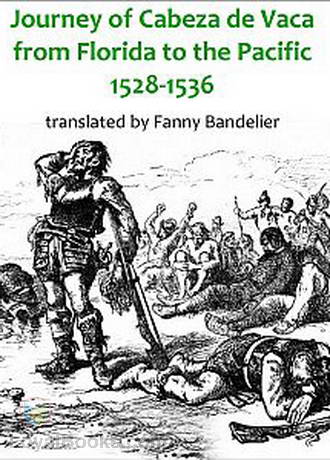
Few stories of shipwreck and survival can equal that of the 16th century Spaniard Alvar Núñez Cabeza de Vaca who, cast ashore near present day (USA) Tampa Bay, Florida, in 1528, survived eight years of hand-to-mouth existence among the Indians of the South and Southwest, and who walked on foot across the plains to the Pacific Coast, arriving in Mexico in 1536. In 1542 he published an account of his adventures, and the present reading is based on Fanny Bandelier’s English translation of that text.
Cabeza de Vaca, along with three other survivors, two Spaniards and a North African (Estévanico, a black slave) endured incredible hardships. Cabeza da Vaca was, himself, at first enslaved by the Indians, forced to dig roots with his bare hands for food. However, he soon showed powers of adaptation that allowed him to survive. He became a trader, bartering “seashells and cockles” from the coast for hides, red ochre, flint, and deer hair tassels from the inland tribes. “Trade suited me well,” he writes, “because it gave me liberty to go where I pleased.” The Indians “rejoiced greatly when seeing me and I would bring them what they needed, and those who did not know me would desire and endeavor to meet me for sake of my fame.” Cabeza de Vaca’s “fame” soon grew to include a reputation as a healer. In return for his “cures,” the Indians gave him “all that they had,” which included food, often in perilously short supply.
The success of the survivors’ final overland treck in search of Spanish settlement reflected their comprehension of Indian customs and values. They were passed along from one tribe to another, accompanied by an entourage of friendly natives. At each stop, Cabeza de Vaca saw to it that the food and presents he received were distributed to his followers by their chiefs, thus ensuring their loyalty.
After eight years among the Indians, Cabeza de Vaca had a hard time adjusting to “civilization.” He writes that the Spanish governor in Mexico “received us very well, giving us what he had, for us to dress in; but for many days I could bear no clothing, nor could we sleep except on the bare floor.” His first person narrative is an exciting tale of survival “against the odds.”
(Introduction by Sue Anderson)

Other Audiobook
Audiobook: La Salle, Discovery of The Great West
Parkman has been hailed as one of America’s first great historians and as a master
Audiobook: Baled Hay: A Drier Book than Walt Whitman’s ”Leaves o’ Grass”
There can really be no excuse for this last book of trite and beautiful sayings.
Audiobook: Jarwin and Cuffy
Jarwin is an English sailor who has been shipwrecked. He is stranded on a raft
Audiobook: Birds, Vol. I, No 1, January 1897
Birds, Illustrated by Color Photography was a monthly publication of the Nature Study Publishing Company
Audiobook: White Tail the Deer’s Adventures
White Tail is the son of Father Buck, who is the leader of the herd.
Audiobook: Collected Poems of Rupert Brooke
Rupert Chawner Brooke (August 3, 1887 – April 23, 1915) was an English poet known
Audiobook: Selected Essays of Samuel Johnson
This is a volume of selected essays by “the great master of reason” Samuel Johnson.
Audiobook: LibriVox 11th Anniversary Collection
“LibriVox is a hope, an experiment, and a question: can the net harness a bunch
Audiobook: Theodoric the Goth
Theodoric the Great (~454-526) was king of the Ostrogoths during the time of the terminal
Audiobook: Life and Adventures of Santa Claus (Version 3 Dramatic Reading)
L. Frank Baum takes us through the adventures of Santa Claus beginning with his adoption
Audiobook: American Psychology, 1900-1922
This is the first of what is intended to be three projects featuring journal articles
Audiobook: Short History of Russia
A Short History of Russia by Lucy Cazalet is a helpful introduction to the people,